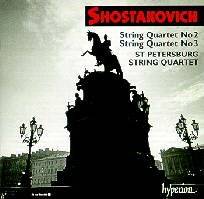
It is good to have a new cycle of these works going on although the Decca
set by the Fitzwilliam String Quartet still remains an imposing edifice in
these, the most personal and arguably the greatest quartets ever written.
It is a known fact that the composer explored his personal tragedies through
these chamber works, leaving the more public outbursts to the symphonies.
The Second Quartet is a great work, full of highly original touches and permeated
with a brooding misery, oppressive at times.
Indeed the movements almost betray operatic influences with titles such as
Overture, Recitative and Romance and Waltz. These bizarre connections ensure
that the quartet is out to shock from the start, and such is the passion
and fire imbued within the music that one may feel emotionally drained
afterwards. The difficult tones of the Overture are superbly handled by the
St Petersburg players with Aranovskaya and Teplyakov digging in with customary
vigour. The Recitative and Romance is cooler, more detached than the FitZwilliams
but impressive nonetheless.
Waltzes are not a strongpoint in St Petersburg but Themes and Variations
definitely are. The sense of loss and devastation is mind-boggling as is
the horror and calamity of it all. The war is definitely a keyword here and
the horrors of Russian suffering are not far away in the explosive music,
almost a calm before the storm. That storm explodes in the motoristic Third
Quartet, another masterful work, this time a five movement epic with subtitles
that were later removed. Once again the war is the main viewpoint, and indeed
I could not but be moved by these Russian players' passionate portrayal of
such highly emotional music.
The first two movements are taken at a cracking pace and the balance between
instruments is breathtakingly precise, such is the players deep commitment
to Shostakovitch's vision. I warmed to their portrayal of the mystic Adagio,
a short but intense movement like a field after battle. The masterly Moderato
is also winningly done with a sense of resignation and acceptance of the
futility of war.
As mooted earlier, it would be difficult to match these performances for
sheer passion and commitment although my selected comparison, the Fitzwilliams
on Decca run them close. Ultimately I would plump for this superbly recorded
version with copious notes by Robert Matthew Walker and a digital recording
that is almost perfectly balanced. The vision and power behind these works
remains a mystery but the St Petersburg Quartet are the closest ever to the
final solution.
Reviewer
Gerald Fenech
Performance:

Sound:

